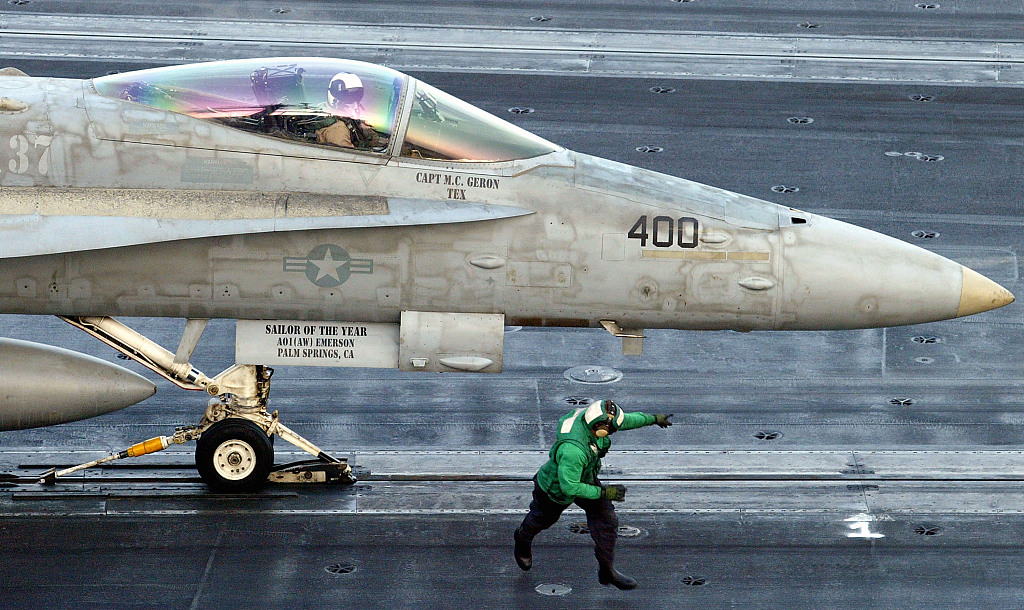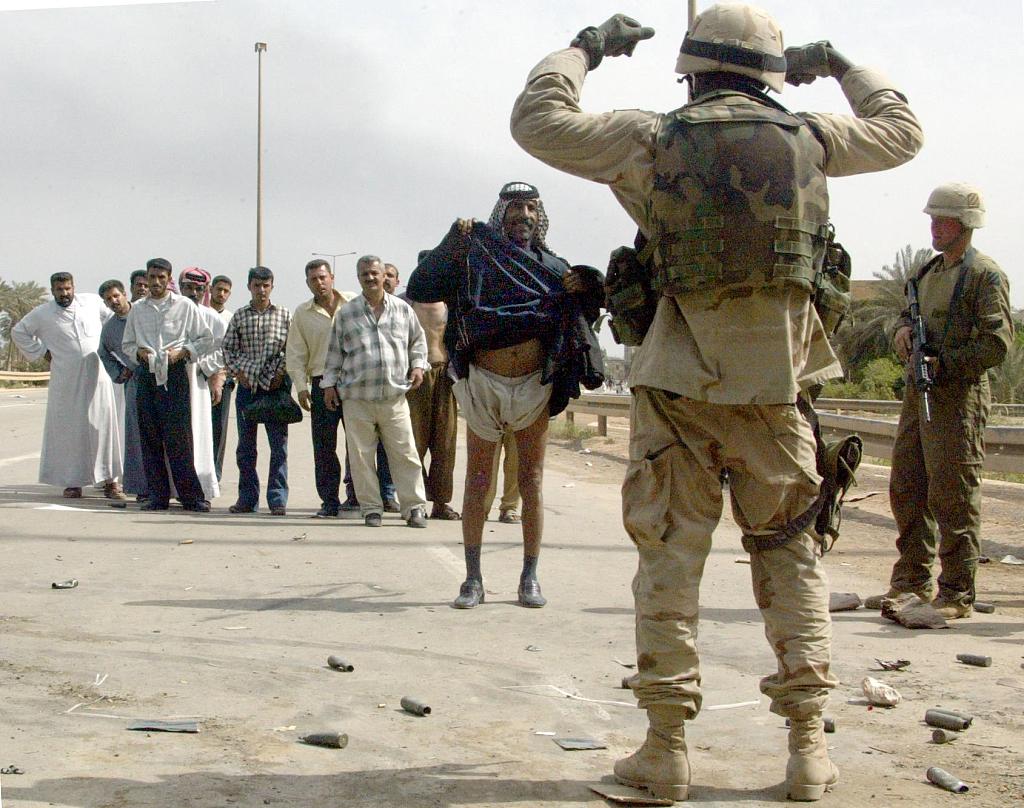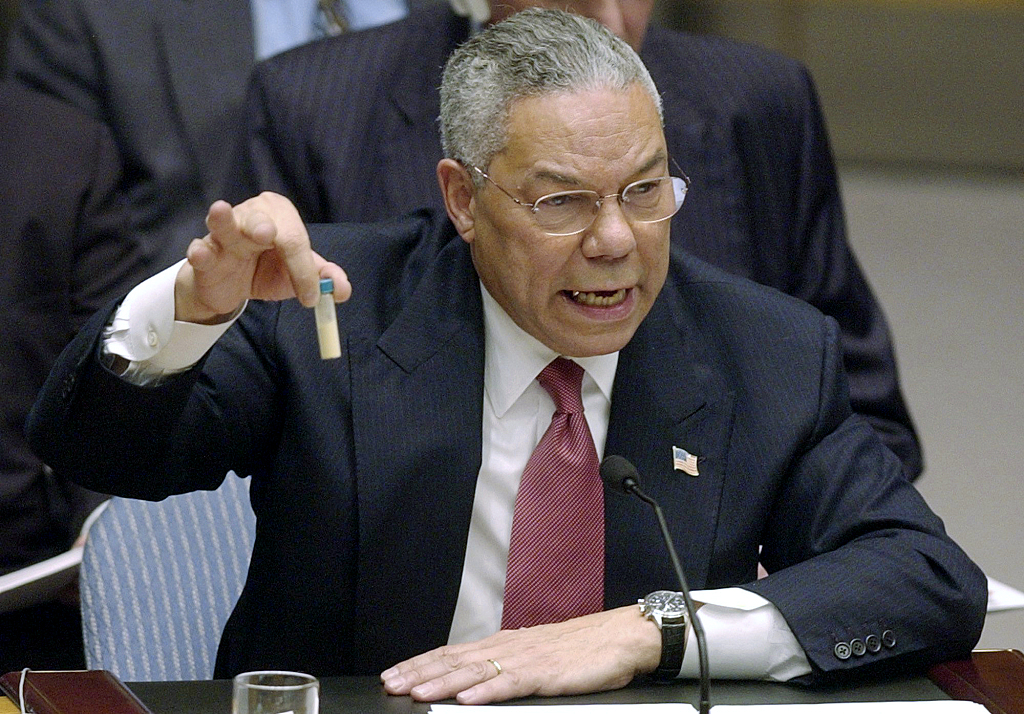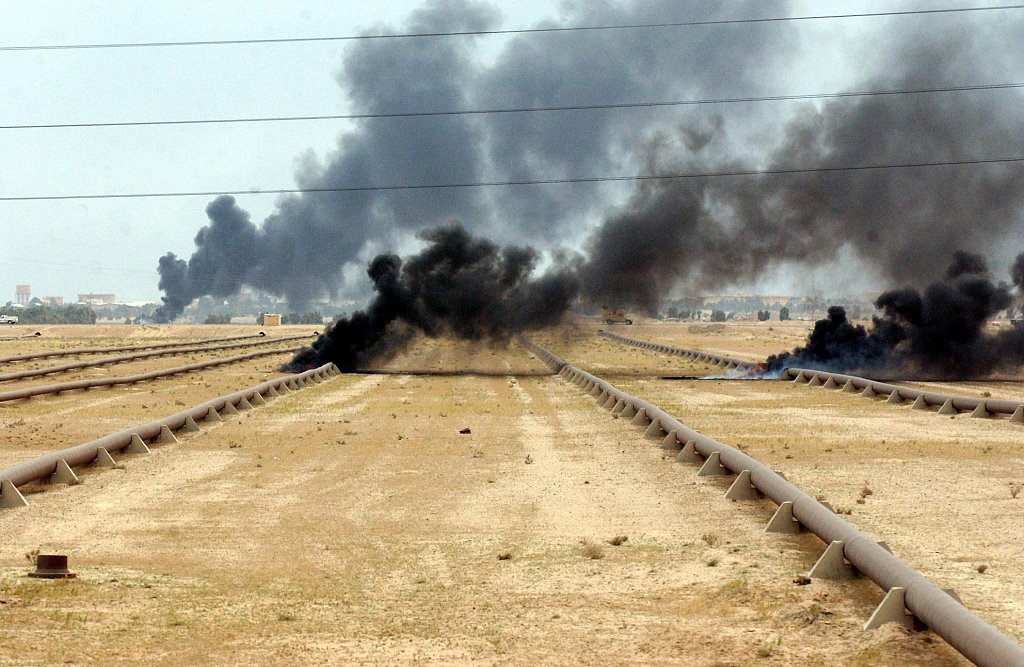This month, 20 years ago, an illegal and unjust war for any number of reasons beyond suspicions of weapons of mass destruction (WMDs) and terrorism was unleashed on Iraq by the U.S.-led coalition.
The U.S. invasion not only caused a large number of civilian deaths but also obliterated the balance of power inside Iraq. Extremist groups have now emerged in the country, and the entire Middle East faces serious terrorism threats.
It was a war with the Iraqi people and all those who lost blood, but also a war for "big oil."

A U.S. Navy F/A-18 Hornet prepares to launch from the flight deck of the USS Constellation shortly after U.S. President George Bush declared that war against Iraq had begun in the Persian Gulf, March 20, 2003. /CFP
A U.S. Navy F/A-18 Hornet prepares to launch from the flight deck of the USS Constellation shortly after U.S. President George Bush declared that war against Iraq had begun in the Persian Gulf, March 20, 2003. /CFP
An anti-terrorism fight that brought more terrorism
The war itself went faster than expected. It took only around six weeks to defeat the Iraqi armed forces. But the "accomplished mission" didn't secure the peace. Looting and violence became commonplace across Iraq.
Iraq was overrun with terrorism in the aftermath of the war, and civilians became the main target of terrorist attacks. According to data from Iraq Body Count, a non-governmental organization in the UK, the total violent deaths including combatants in Iraq crossed 288,000.
The anti-terrorism fight actually brought more terrorism, and not a single entity won in this war, CMG commentator Kong Lin said.
Most of the early casualties were caused by American forces, particularly in the Shura region of Baghdad. However, according to the website Civilian Deaths during the Iraq War, there was an average of 3,400 terrorist attacks annually in Iraq over the 19 years from 2003 to 2021, with each attack killing four innocent people on average, Mohammed Ali, acting president of the Iraqi Relief Organization, told CMG.
By any measure, this is a failure of the United States. Playing games with words and refusing to admit defeat won't help, said Richard David Wolff, an American economist.
"Obviously, the U.S. was trying to control the Middle East by various means. At that time, except for its ally Saudi Arabia, Iraq was clearly a regional power in the Middle East with some strength but not the ally of the U.S.," Diao Daming, a researcher at National Academy of Development and Strategy, Renmin University of China, told CMG, adding, "Under the pretext of the war on terrorism, the U.S. overthrew the Saddam regime, realized a certain degree of control over Iraq, and strengthened its control over the Middle East."

A U.S. soldier orders a tribesman to lift his robe, fearing suicide bombers, on al-Durra highway, Baghdad, Iraq, April 10, 2003. /CFP
A U.S. soldier orders a tribesman to lift his robe, fearing suicide bombers, on al-Durra highway, Baghdad, Iraq, April 10, 2003. /CFP
A war on false pretense
Months before the invasion, the U.S. had been looking for a justification to invade Iraq, bring about a regime change and destroy the alleged WMDs.
Holding up a tiny vial of "white powder," Colin Powell, who was then U.S. secretary of state, told the world on February 5, 2003 that the U.S. had no choice but to go to the battlefield. "We know that Saddam Hussein is determined to keep his WMDs, he's determined to make more," Powell said on the dais of the United Nations Security Council.
Powell's presentation did not convince the UN Security Council. But a little over a month later, on March 20, with the bombing of the presidential palace Baghdad, the U.S.-British coalition forces invaded Iraq without the authorization of the UN, brutally rewriting the history of a country.
After the invasion, it was discovered that Iraq had basically ended its nuclear weapon program in 1991.
"For bureaucratic reasons we settled on one issue, weapons of mass destruction, because it was the one reason everyone could agree on," then-Deputy Defense Secretary Paul Wolfowitz told Vanity Fair in 2003.

U.S. Secretary of State Colin Powell holds up a vial he said could contain anthrax as he presents evidence of Iraq's alleged weapons programs to the United Nations Security Council, February 5, 2003. /CFP
U.S. Secretary of State Colin Powell holds up a vial he said could contain anthrax as he presents evidence of Iraq's alleged weapons programs to the United Nations Security Council, February 5, 2003. /CFP
A war for big oil
Before the invasion, the domestic oil industry in Iraq was fully nationalized and closed to western companies. In October 2000, Saddam Hussein moved to switch Iraq's oil trade from the dollar to the euro. But the invasion of 2003 put the country's oil industry back into dollar denomination. A decade of war later, the industry is largely privatized and utterly dominated by foreign firms.
"I am saddened that it is politically inconvenient to acknowledge what everyone knows: the Iraq war is largely about oil," former Federal Reserve Chairman Alan Greenspan wrote in his memoir.
To get a slice of Iraq's oil pie, the U.S. tried to change Iraq's national legal system by hiring the consultancy firm Bearing Point and pressure the newly-elected Iraqi government to pass the new law.
In January 2007, the Bush administration set specific benchmarks for the Iraqi government, including the enactment of the "Hydrocarbons Law to promote investment, national unity and reconciliation."
Drafted by the Western oil industry, the Hydrocarbons Law was to lock Iraq into private foreign investment. But due to opposition from public and the Iraqi parliament, the law could not pass.
The U.S. and Iraq's partners appeared keen to help the country become energy-independent. However, 15 years after the invasion, oil accounts for 69 percent of Iraq's gross domestic product and 95 percent of state revenue, while the promise of new energy-related jobs across the country has yet to materialize.
The oil and gas sectors account directly for less than 2 percent of total national employment, according to data from World Energy Outlook.

Oil pipelines burn near Nasiriya in southern Iraq, March 22, 2003. /CFP
Oil pipelines burn near Nasiriya in southern Iraq, March 22, 2003. /CFP
By failing to learn, by choosing to forget, the U.S. moves from Afghanistan to Syria and Iraq.
"Whether it is Iraq, Syria or Afghanistan, wherever the U.S. military goes, what we see is turmoil and division, families are destroyed, and a mess full of holes is left behind. America's power and role is to destroy, not to build," Chinese Foreign Ministry spokesperson Hua Chunying once said.